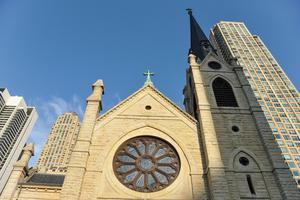What Can I Do If I Can’t Get to Sunday Mass?
DIFFICULT MORAL QUESTIONS: ‘I don’t have a way to get to Mass … I’m so scared of going to hell. What can I do?’

Q. I’ve been to Mass only one time in two years and it breaks my heart. I don’t have a way to get there. I’m 72 years old. I am so scared of going to hell. What can I do? Please help. — Sherry
A. The fulfillment of an obligation depends upon one’s ability to fulfill the obligation. One cannot be morally obliged to do what one is incapable of doing. This is why the Catechism of the Catholic Church teaches that:
the faithful are obliged to participate in the Eucharist on days of obligation [including every Sunday], unless excused for a serious reason (for example, illness, the care of infants) or dispensed by their own pastor. Those who deliberately fail in this obligation commit a grave sin (2181).
You say you lack transportation to Mass. I presume you have made a good faith effort to find transportation, including asking your children and close friends for help. You should also speak frankly to your pastor and ask him to intervene in some amelioratory way. If he doesn’t already have a ministry to shut ins, he should begin one. He has responsibility to meet the spiritual needs of the faithful in his parish. If he cannot arrange for you to be driven to Mass, he can at least arrange for you to receive Holy Communion at home. If he refuses to accommodate such a request, speak to the bishop or vicar for clergy of your diocese and explain the situation.
In the meantime, your inability to attend Mass certainly qualifies as a serious reason. Only those who are reasonably free to attend weekly Mass who deliberately skip Mass incur culpability for the commission of grave sin. In your case, you have done absolutely nothing wrong, and should feel no guilt for your involuntary inability.
To those who suffer obstacles such as yourself, the Code of Canon Law (CIC) offers salutary advice for keeping holy the sabbath:
If participation in the eucharistic celebration becomes impossible because of … [some] grave cause, it is strongly recommended that the faithful … devote themselves to prayer for a suitable time alone, as a family, or, as the occasion permits, in groups of families. (Canon 1248 §2)
Note that this is not an alternative way of fulfilling the Mass obligation, which “morally ceases to bind when it is impossible to fulfill it” (CIC, ed. Beal, et al., “Commentary,” p. 1446). Nor is it a binding obligation. But it is one way to consecrate Sundays to the worship of God.
One recommendation you might consider is praying on Sundays or Saturday evenings what some refer to as a “Dry Mass,” essentially the elements of Mass except the Offertory, Consecration and Communion: singing a hymn of praise, reciting a prayer of repentance, reading the Mass readings for that day, taking some time of reflection upon the readings, praying intercessions, then ending with a Spiritual Communion followed by another hymn. My family and I held something similar every week during the COVID-19 lockdown.
One common prayer for Spiritual Communion reads:
My Jesus, I believe that You are present in the Most Holy Sacrament. I love You above all things, and I desire to receive You into my soul. Since I cannot now receive you sacramentally, come at least spiritually into my heart. I embrace You as if you were already there, and I unite myself wholly to You. Never permit me to be separated from You. Amen. (St. Alphonsus Liguori)

















